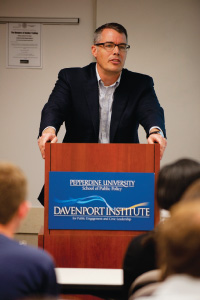A Tale of Two Cities
Pete Peterson and the Davenport Institute help revive public trust in the city of Bell.
In July 2010 the Los Angeles Times infamously outed the City of Bell, California, for awarding its city officials the highest salaries in the nation.
The report opened up the city’s government to scrutiny, since the salaries were disproportionately large compared to bell’s underperforming economy and particularly high rate of unemployment.
Eventually, a number of city officials were arrested—leaving the citizens of bell without a functioning government and the city’s coffers depleted.
In stepped Ken Hampian, the recently retired city manager of San Luis Obispo and an advisory council member of Pepperdine’s Davenport Institute for Public Engagement and Civic Leadership at the School of Public Policy. He was named Bell’s interim city manager in September 2011 and turned to his longtime allies at Pepperdine for advice, launching what has become a significant partnership in the city’s reconstruction.
In a series of discussions beginning January, Davenport director Pete Peterson began advising Hampian and Bell’s new leaders about the 2012-2013 budget drafted this spring. “I was brought in as an advisor to their budgeting process, as one of the first things they’ve tried to do is open up their annual budgeting process to more public scrutiny,” Peterson explains. “New city staff are in place, as well as an entirely new city council, and they want to make the city more participatory and transparent—particularly in its financial dealings.”
The city is crippled by its reputation right now, he says, and the citizens of the town are furious about the betrayals levied against them, which allegedly include the city officials discouraging or repressing civic engagement, inflating property taxes to line their pockets, and instigating voter fraud in order to quietly pass self-benefiting decrees. Though angry, however, the citizens are not sure of how to approach healthy civic engagement.
“The history there, or at least the recent history, is of Bell’s government being so private that now you can see people coming to budget workshops with a fair degree of caution,” Peterson observes. “The concept of engagement with the local government is such an entirely new experience.”
When Hampian, Bell’s staff and council wanted to engage their residents, they asked Peterson to consult on a regular program of annual budget workshops in which the budget would be assembled with participation from taxpayers. He helped kick off the process in January by co-facilitating the first “Goal-Setting Community Forum” in Bell’s Community Center, which drew a modest crowd of intrigued citizens for a Saturday morning of brainstorming, discussion, and informal vote casting on the most important issues needing immediate attention.
The meeting gave ordinary, tax-paying residents of Bell the chance to prioritize for themselves what action was needed after years of governmental isolation and neglect. “It was very encouraging to see a fairly decent turnout from folks that had simply never been invited to something like this before,” Peterson notes, adding that the feeling throughout the forum was quietly hopeful about a new era for the city.
Since his involvement with the city began, Peterson’s partnership with Bell’s new and interim management has served as a living, breathing case study of public engagement and civic renewal, one that he hopes will inspire other cities to adopt further dialogue between local government and residents. “I’ve been tremendously encouraged thus far by both the citizens of Bell and the new city leaders, who have been at the forefront of trying to change the identity of a city now known as a symbol of corruption.”
The partnership also strengthened ties between the Davenport Institute and Hampian, who was named the institute’s 2012 city manager-in-residence. After three months as an advisor, Peterson has transitioned into a consulting role, while Hampian visited the Malibu campus in March to present a lecture about his experiences rebuilding Bell in the wake of scandal. Peterson hopes that the Davenport Institute will continue to work with Bell and other California cities in crisis in the future. This summer, Peterson helped place a recent SPP graduate in a summer-long position at the City, and this fall, Peterson is due to bring a Bell council member and staff person out to Washington, DC’s Hudson Institute to talk about the public’s role in budget processes.
“What’s been interesting for us as a small nonprofit institute that supports legitimate public policies around the state is that if we can make these leaps as an institution in just seven years, then anything is possible for us.”
WEB EXCLUSIVES:
Listen to Episode 54 of the Pepperdine People Podcast series, in which Peterson and
Hampian discuss their roles in, and the future of, the City of Bell.
School of Public Policy graduate Sandeep Kaur (MPP '12) received a summer internship
with the City of Bell.In the following Q&A, she shares her experiences on the front line of a new era in
Bell's history...
Did the City of Bell case interest you when the story broke?
The City of Bell is a very interesting case. I still wonder how this all happened
when we have auditors' set, who audit cities thoroughly. The roots of corruption were
only spread out among the senior management. Why didn't anyone raise their voice to
say something? It's still a mystery to me.
As a California resident and public policy master's student, what were your thoughts
on the situation at first?
A lack of good leadership and policies explain this situation really well. The city
manager was corrupted so much that he didn't even consider the impact on Bell residents.
After all, a city generates revenue through its residents and their money paid those
high salaries. Instantly, I recalled a lecture on leadership from professor Ted McAllister's
class, about why a good leader is important for the society. Public Policy isn't just
making a difference as everyone mentions, it's about fixing policies and leading the
right way.
What did you hope to accomplish through your internship?
I hope to learn to differentiate between right and wrong. City of Bell is in this
mess because there was no one who questioned the policies and instead followed the
leader with blind trust. Obviously, I hope to gain experience that will take me far
in my future goals.
What have been your responsibilities as an intern at the City of Bell?
So far, my responsibilities have been generating content for the new website that
the City of Bell is planning to launch in January 2013. I gather all the information
on the six divisions of Community Services Department, so the Senior Analyst can turn
it to the web designers. In addition, I have written letters in response to residential
complaints and assisted with policies for the Community Services Department, for instance,
what types of rules and regulations need to be followed when alcohol is permitted
in private events held in hired public buildings.
Have you encountered any challenges personally, as an intern?
Gathering information can be a bit challenging because the recent problems and staff
turnover has created inconsistencies. I interned with the City of Anaheim last summer
and it was noticeably more efficient.
Are you pleased with the progress made so far in Bell?
Somewhat. I believe my primary focus should be on lack of policies that the Community
Services Department is suffering. My degree has taught me how to think critically
and analyze situations before tackling them. This internship ends on September 1 and
my plan is to work for a local government, even if it's out of California.

